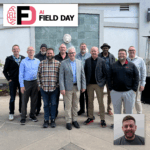|
|
This video is part of the appearance, “HPE Presents at AI Field Day 7“. It was recorded as part of AI Field Day 7 at 10:30-12:00 on October 29, 2025.
Watch on YouTube
Watch on Vimeo
At AI Field Day 7, Robin Braun from HPE and Luke Norris from Kamiwaza presented their collaborative smart city solution, highlighting a real-world deployment in Vail, Colorado. The focus was on using agentic AI systems to improve core municipal operations such as information access, public safety, affordable housing oversight, and regulatory compliance. By integrating Kamiwaza’s backend intelligence with user-friendly digital interfaces powered by HPE infrastructure, they demonstrated the potential of AI-driven digital concierges and fire detection tools. These virtual assistants can provide localized, real-time information to residents and visitors about everything from dining options to emergency weather updates, while the fire detection system synthesizes data from existing city cameras, 3D geospatial models, and real-time weather data to support proactive emergency response.
One of the less glamorous but highly impactful use cases involves automating the interpretation and management of property deeds and housing regulations, many of which were previously stored on microfiche from decades past. HPE and Kamiwaza developed a solution that digitizes and then applies natural language processing and ontology mapping to thousands of deed restriction documents. This not only saves significant full-time staff hours but also enables scalable and equitable housing enforcement without the need for proportionate increases in bureaucratic staffing. Additionally, the system allows both government and citizens to query property data interactively, improving public access and transparency, and supporting future zoning or service decisions with much better data insight.
A significant part of the presentation focused on the long-term vision and ROI of public sector AI deployments. These weren’t just experimental pilots; instead, they already yielded tangible cost and time savings by replacing manual, repetitive processes with AI agents. Critical examples included the automation of 508 compliance audits, which traditionally cost millions over years but now can be performed in weeks with a fraction of the cost. Additionally, through a network of partners such as SHI for deployment and ProHawk for video enhancements, the smart city platform is designed to scale, support ongoing improvements, and adapt to increasing demands. The project demonstrates how AI transforms government services not by reducing workforce but by enhancing their capabilities, decision-making speed, and community responsiveness in areas from environmental risk to urban planning.
Personnel: Luke Norris, Robin Braun










